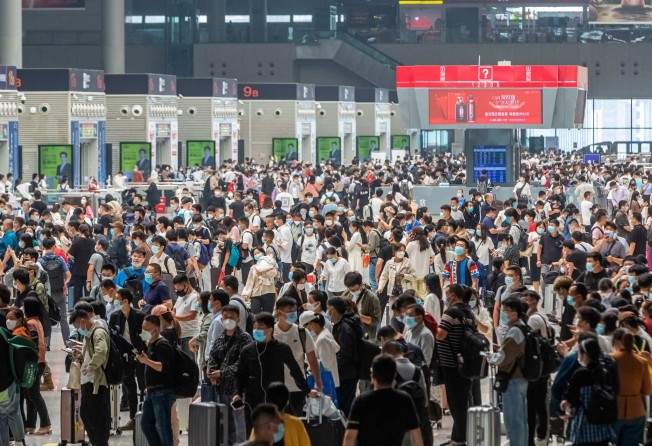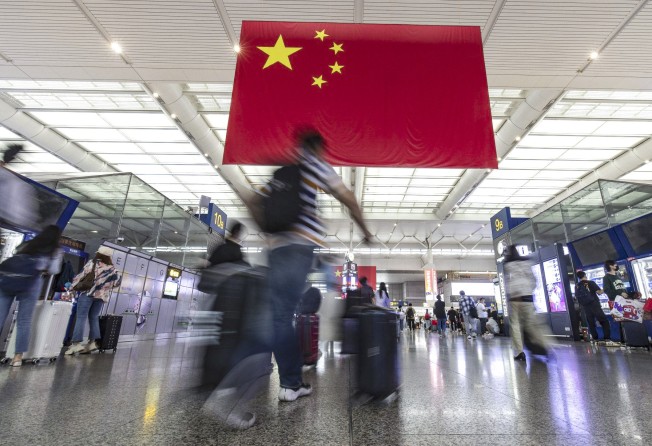
Travel just a memory for Chinese staying home for the National Day holiday
- This year’s October ‘golden week’ is likely to lose its lustre, with the number of train trips expected to be the lowest since the pandemic began
- Covid-19 controls have been tightened ahead of the break and the party congress in Beijing, and people have been urged not to leave their cities

For years, the National Day holiday has given tourism and spending a boost in China, but this year’s “golden week” is likely to lose its lustre as many people stay home.
Covid-19 controls have been tightened ahead of the break – from October 1 to 7 – and a key political gathering in Beijing. And authorities are expecting the lowest number of train trips to be made in the holiday period since the pandemic began – 68.5 million from September 28 to October 8.
Trains are the most popular way to travel medium and long distances in mainland China. Some 110 million train trips were taken during last year’s National Day holiday, down from 120 million the previous year, according to the Ministry of Railways. In 2019, before the pandemic, that number was 138 million.

Li Yan, 35, who works in the financial sector in Nanjing, capital of eastern Jiangsu province, said she missed the days before Covid, when she could travel freely.
“At first I could still travel to other provinces with a face mask on, then it was just within the province. For this year’s holiday the ‘advice’ is to stay in my city,” Li said. “It’s quite a contrast to the pre-Covid days when I was spending the holiday sipping coffee in Paris or admiring maple trees in Kyodo.”
China closed its borders in the spring of 2020 in a bid to stop the spread of the coronavirus. And as the situation eased within China, hundreds of millions of tourists – unable to travel abroad – flocked to hotspots across the mainland during the National Day holiday that year, contributing to the country’s economic recovery.
Tourism revenue in the holiday period was still down by 30 per cent from the previous year, but retail sales went up by 5 per cent, suggesting consumer confidence had rebounded after the country appeared to have contained the virus through measures like mass testing, contact tracing and quarantine.
By the end of 2020, China was the only major economy in the world to report positive GDP growth – initially reported as 2.3 per cent for 2020 but later revised down to 2.2 per cent.
It was a different story last year, as outbreaks of the Delta variant dampened enthusiasm for travel and Beijing tightened restrictions after summer outbreaks in Jiangsu and Fujian. Millions of people employed by the government or state-owned enterprises were told not to leave their province, and several places sent letters to migrant workers asking them not to return home. As a result, holiday travel spending fell by 4.7 per cent from 2020 and the number of train trips was also down 1.5 per cent.
Li said she had been put off travelling by an experience in August last year when she visited the western region of Xinjiang, as Nanjing had an outbreak.
“I was trapped in a hotel room in Xinjiang for around two weeks and couldn’t leave until I’d had dozens of Covid tests because I’d come from Nanjing,” she said. “It was so terrible, and since then I’ve stayed put every holiday. I’ve lost the courage to travel.”
As well as having to undergo frequent Covid-19 testing, Chinese have also been urged to stay in their cities from September 10 until the end of October in a bid to contain the spread of the Omicron variant ahead of the ruling Communist Party’s national congress in Beijing – a five-yearly event that begins on October 16.
Passengers on planes, trains and interprovincial buses and ferries must provide negative PCR test results from the previous 48 hours. The National Health Commission has also urged people travelling between provinces and regions to “voluntarily” take PCR tests on arrival.
University students have been asked to stay on campus during this period, and parents have been told to avoid “non-essential” travel with children of primary and middle school age. Pupils who do leave their cities must self-isolate for several days when they return – seven days for those in Beijing.
Retiree Meng Shimao, 70, who lives in Xiangtan in the central province of Hunan, said he had initially planned to go to Beijing with his 11-year-old granddaughter during the break.
“I think every Chinese citizen wants to visit the capital some time, and the National Day holiday is a good time to do it. I wanted to go to Tiananmen Square and see the red flag being raised and the flowers for National Day and the 20th party congress,” Meng said. “It looks so beautiful on the news.”
But he abandoned the plan when he heard about the tighter restrictions. “I hope I can go to Beijing next year instead – hopefully there won’t be any Covid by then.”
Ren Wanle, an analyst with Lubang, a tourism services company in Henan, said the holiday week was no longer “golden” when people were advised not to travel.
“The restrictions are like a curse,” Ren wrote in an article on social media network WeChat. “They’re torture for the tourism sector, make travellers panic and they have a huge impact on the economy.”